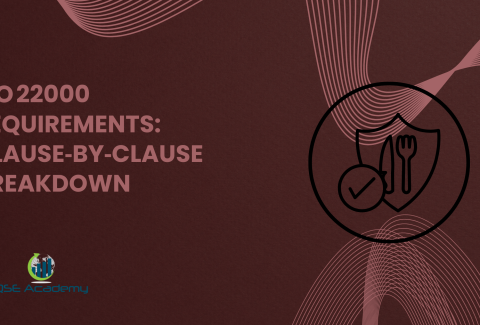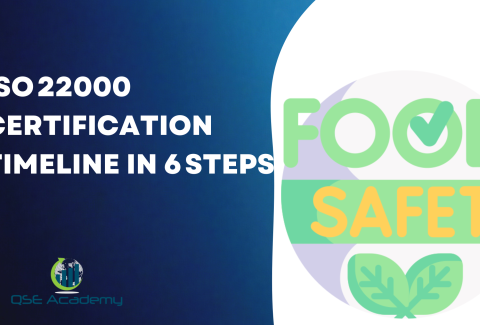IFS V8 Record‑Retention & Traceability Rules
Last Updated on December 23, 2025 by Hafsa J.
Why This Topic Matters More Than Most Teams Realize
When I support companies during IFS audits, one theme comes up again and again:
records and traceability are where teams get caught off guard.
Most facilities produce safe food. Most follow procedures. But when an auditor asks:
“Show me the batch record, supplier approval, CCP monitoring logs, and packaging traceability for this product from 6 months ago”
—you either can retrieve it confidently in minutes, or the room gets quiet.
IFS V8 expects more than paperwork—it expects complete, controlled, and traceable evidence that food safety and quality requirements were actually followed.
By the end of this article, you’ll know exactly:
- What records you need
- How long to keep them
- How traceability must function under IFS V8
- And how to avoid the most common audit findings
Why Record-Retention Matters in IFS V8
Record-keeping isn’t just a compliance obligation—it’s proof of everything you’re claiming.
Your HACCP plan?
Meaningless without monitoring records.
Your cleaning procedures?
Only valid if cleaning logs exist and are complete.
Your allergen management controls?
Auditors want signatures, timestamps, and verification—not assumptions.
IFS treats records as legal evidence of implementation. Missing, illegible, or inconsistent records create doubt—not just nonconformities.
A common misunderstanding:
Some companies believe only CCP records require formal retention rules. Under IFS V8, all system-critical records must be controlled and retained.
 What Records Must Be Retained? (IFS V8 Mandatory Record Categories)
What Records Must Be Retained? (IFS V8 Mandatory Record Categories)
IFS V8 expects structured documentation across the whole food-safety system. That includes:
- CCP/OPRP monitoring logs
- Training and competency records
- Cleaning and sanitation logs
- Allergen-control and changeover verification
- Supplier approval and raw material compliance
- Maintenance and calibration documentation
- Complaints, deviations, and CAPA records
- Mock recalls and traceability exercises
- Product specification and label approval evidence
- Environmental monitoring results (if applicable)
If a process affects food safety or regulatory compliance, the record must exist, be controlled, and be retrievable.
Pro Tip:
Signatures, initials, timestamps, and verification checkmarks aren’t optional—they’re proof of accountability.
Retention Timelines Explained
IFS doesn’t set a fixed universal retention time. Instead, retention must align with:
- Product shelf life
- Legal requirements
- Customer or retailer contracts
- Risk-based justification
A common rule used in audits:
Shelf life + X years (usually 1–3 years).
Example table:
| Product Type | Shelf Life | Minimum Retention Example |
|---|---|---|
| Fresh/chilled | 7–30 days | Shelf life + 2 years |
| Frozen | 12–36 months | Shelf life + 1–3 years |
| Ambient | 12+ months | Shelf life + 2 years |
Common pitfall:
Using one retention period for all product categories—even when risk levels differ.
Traceability Requirements Under IFS V8
IFS expects systems that allow full traceability:
- One step forward
- One step back
That includes:
- Raw materials
- Ingredients
- Primary and secondary packaging
- Rework and intermediates
- Finished goods
- Outsourced processing or logistics
- Private-label variants
An auditor should be able to select a finished batch code and trace:
Supplier → Goods receipt → Storage → Production batch → Packaging → Shipment → Customer
If any link in that chain isn’t documented, it becomes a finding.
Mock Recalls & Traceability Testing
IFS requires periodic traceability verification, typically through a mock recall.
What auditors expect:
- Ability to demonstrate traceability within 4 hours or less
- Accuracy (no missing records, gaps, or unverified assumptions)
- Evidence of cross-checking, not just record collection
- Documentation of results and improvement actions
A real example:
One site traced ingredients and finished product perfectly—but forgot to include corrugated packaging. That resulted in a major nonconformity because packaging is part of traceability.
Digital vs Paper-Based Systems: What’s Acceptable?
IFS doesn’t require digital systems. Both formats are acceptable—but they must be:
- Controlled
- Secure
- Readable
- Retrievable
- Backed up
- Accurate
Paper is fine — unless:
- Records get damaged
- Ink fades
- Storage is uncontrolled
- Retrieval takes too long
Digital is fine — unless:
- Access isn’t restricted
- Backups don’t exist
- Files are editable without traceability
- Login logs don’t prove authorization
Pro Tip:
Hybrid systems are perfectly acceptable — uncontrolled systems are not.
Change-Control & Record Integrity Expectations
Records must show:
- Who completed them
- When they were completed
- Who reviewed or verified them
- Who approved changes
Unacceptable corrections:
- White-out
- Scribbled overwrites
- Backdating
- “Fixed later” entries
Acceptable correction method:
Single line strike-through → updated entry → initials → date
IFS expects transparency—not perfection.
FAQs
Can we scan paper records and discard originals?
Yes, if the scanned copies are legible, controlled, backed up, and retrievable—and if legal or customer requirements allow it.
Do subcontracted storage or logistics need traceability records too?
Absolutely. If they handle product, packaging, or ingredients, they’re part of the traceability chain.
What happens if we fail a traceability test?
It must be treated as a nonconformity—with corrective actions, root-cause analysis, and documented follow-up.
Conclusion: Record Control Isn’t Paperwork — It’s Risk Protection
Strong record-retention and traceability practices don’t just satisfy IFS—they protect your business during:
- Recalls
- Regulatory investigations
- Customer claims
- Certification audits
- Supplier or retailer compliance checks
When records are clear, complete, and easy to retrieve, the audit becomes predictable—and traceability stops feeling like a stress test.
If you’re ready, I can help with:
- A full traceability matrix template
- A mock-recall test script
- Or a complete record-retention policy aligned to IFS V8
Whether it’s ISO 9001, ISO 22000, or the cosmetics-focused ISO 22716, I’ve spent my career I’m not here to call myself an expert—I prefer “enthusiast” because I truly love what I do. When I’m not writing about standards, you’ll probably find me playing Piano 🎹, connecting with people, or diving into my next big project💫. I’m an engineer specialized in the food and agricultural industry
make ISO standards less intimidating and more approachable for everyone.
turning complex jargon into clear, actionable steps that businesses can actually use.
There’s something incredibly rewarding about helping people navigate food safety and quality management systems
in a way that feels simple, practical, and even enjoyable.
I have a Master’s in QHSE management and over 12 years of experience as a Quality Manager
I’ve helped more than 15 companies implement ISO 9001, ISO 22000, ISO 22716, GMP, and other standards
My clients include food producers, cosmetics manufacturers, laboratories, and service companies
I believe quality systems should be simple, useful, and efficient.










